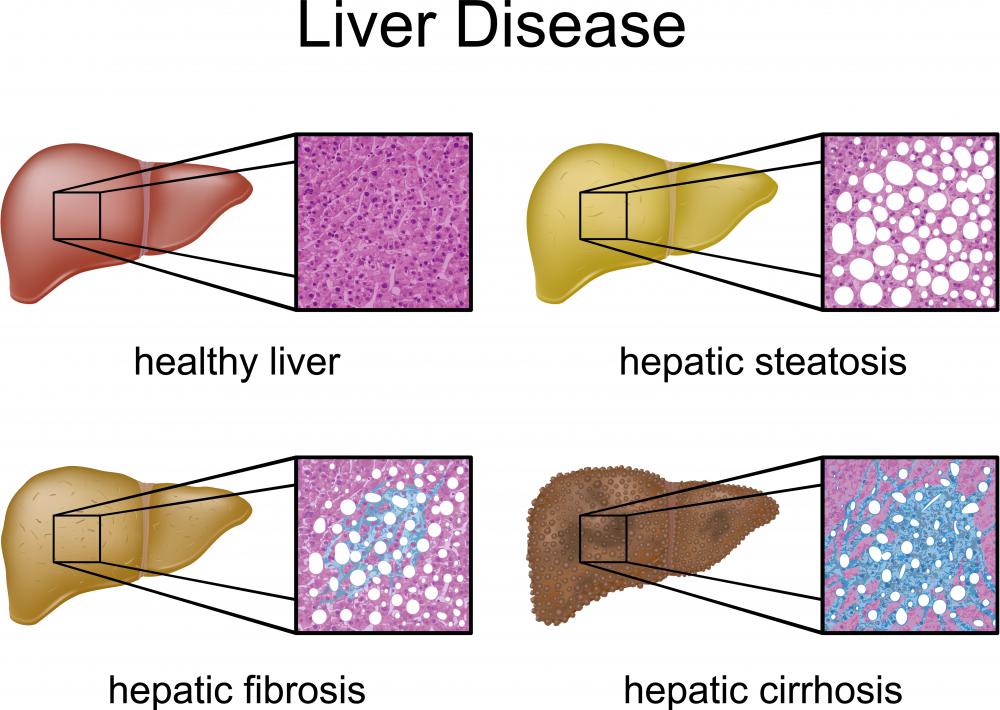At WiseGEEK, we're committed to delivering accurate, trustworthy information. Our expert-authored content is rigorously fact-checked and sourced from credible authorities. Discover how we uphold the highest standards in providing you with reliable knowledge.
What are the Most Common Liver Problem Symptoms?
As the body's largest organ, the liver plays a very important role in the detoxification process of the human body, eliminating poisons and toxins. The liver also plays an important role in the body’s metabolism, among other critical functions. Being such a vital organ, proper care for it is imperative for overall health.
While the liver is durable and regenerative, it is quite possible for it to succumb to disease and disorders. Common liver problems result from hepatitis, cirrhosis and alcoholism. Without proper care and nutrition, the liver can experience functional difficulties and even shut down. Should it shut down completely, liver transplants are sought out.

In addition to maintaining a proper diet, caring for your liver should also include being able to recognize liver problem symptoms. A proper diet is an important preventative measure, but being familiar with liver problem symptoms can help you promptly seek out medical care should your liver experience any problems. Promptly seeking out proper medical care once such symptoms are identified can help avoid a requisite transplant or worse.

Jaundice is the most significant of all symptoms. Recognized by a yellow discoloration of the skin and eyes, the cause of jaundice often includes an excess amount of the bile pigment called bilirubin. When the liver doesn't metabolize the body's bile as it should, the skin and eyes may discolor. Jaundice can be a symptom of hepatitis and alcoholic liver disease.

Liver problem symptoms can also manifest in the stool. Light colored stool, including grey and tan stool, suggests a problem. Stool may become light or pale in color if the body isn't making enough bile or if bilirubin is being blocked from passing through the intestines. Either cause of light colored stool is a clear indicator of liver disease. (It might also suggest gallbladder problems.)

Bloating may signify a liver problem as well. This symptom may occur as a result of a build up of gas in the digestive tract and a retention of fluids in the abdomen. Women may confuse the bloating with a regular menstrual cycle and therefore should be aware if it occurs more frequently.
Excessive fatigue and mental confusion may also signify liver problems. The cause of fatigue, as it relates to liver disease, may be from an alteration of the body’s production of melatonin. It has been noted that approximately 30% to 55% of patients suffering from cirrhosis experience sleep disturbances.
Other liver problem symptoms include: dark urine, excessive itching, vomiting blood, diarrhea, and loss of appetite.

An increase in alcohol or drug intake, along with excessive weight gain and abusing medications may contribute to liver problems. By educating yourself, eating right and taking other preventative measures, you can proactively help reduce the risk of liver disease.
AS FEATURED ON:
AS FEATURED ON:
















Discussion Comments
A continuous check on bilirubin tests can indicate some threat. It's time to say goodbye to alcohol or yourself.
How reversible are alcohol effects? After what period of time from abstaining can you receive recovery! Say 20 years of alcohol every day! No abuse just lots every day.
My eyes are yellow from my childhood. i am 26 now and my urine is also a yellow color. i was affected by jaundice at the ages of 10 and 21. My eyes are yellow but no symptoms of jaundice. What could be the reason? How to clear the yellow color in my eyes?
Well maybe Katin wasn't asking how to be a drunk! Just maybe asking what to avoid if a drink after a meal is a bad thing. A glass of red wine is proven to be a good thing!
And Katin, no alcohol is bad unless you abuse it like with anything! With the more you drink the more risk is involved and it's all just common sense!
Damn, does alcohol mean that much to you? Just avoid drinking in excess.
Why does alcohol have such an impact on the liver. I can think of worse things that we put in our bodies that don't affect the liver, yet excessive drinkers are known to have liver problems after years of drinking. What's in alcohol that causes our liver to stop functioning properly? And, is it all alcoholic beverages that may cause liver problems or can I avoid certain ones?
Post your comments